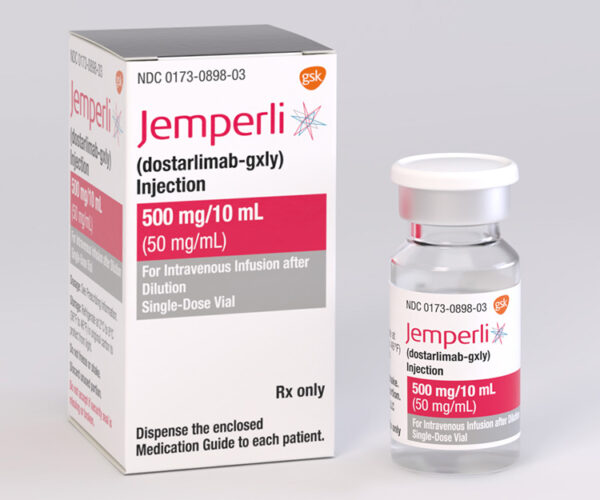The FDA has granted Breakthrough Therapy Designation (BTD) to dostarlimab for the treatment of patients with locally advanced dMMR/MSI-H rectal cancer.
Breakthrough Therapy Designation (BTD) is a special program developed by the FDA to expedite the development and review of new therapies that have the potential to provide significant benefits over existing treatment options for serious conditions. BTD is granted based on early clinical evidence suggesting that a therapy could significantly improve outcomes for patients, either by offering better efficacy or by providing a more effective treatment alternative for conditions that currently have limited treatment options. The goal of this designation is to speed up the availability of these promising therapies to patients in need, allowing faster access to potentially life-saving treatments.
The BTD awarded to dostarlimab for the treatment of locally advanced dMMR/MSI-H rectal cancer marks the second significant regulatory recognition for this drug in the same patient population. The first recognition came in January 2023 when dostarlimab received Fast Track Designation for this indication. Fast Track Designation is another program designed to expedite the development and review process for drugs that treat serious conditions, providing more frequent communication with the FDA and the potential for priority review. The second designation of BTD reinforces the growing recognition of dostarlimab as a potentially transformative therapy for patients with dMMR/MSI-H rectal cancer—a subgroup of rectal cancer patients who often face limited treatment options and poorer prognoses due to the aggressive nature of the disease.
This designation is particularly significant for rectal cancer, a disease that is often hard to treat, especially in patients with high microsatellite instability (MSI-H) or deficient mismatch repair (dMMR). These biomarkers are associated with tumors that tend to be more aggressive and resistant to traditional therapies. Dostarlimab’s promising results in clinical trials, including achieving 100% clinical complete response (cCR) in the study population, highlight its potential to revolutionize treatment for this difficult-to-treat cancer. The accelerated development and review of dostarlimab under BTD could lead to new treatment options for patients with MSI-H or dMMR rectal cancer, improving outcomes and offering hope for patients who previously had limited effective therapies available to them.
Rectal cancer
Rectal cancer originates from the growth of abnormal cells in the rectum, the final section of the large intestine. While rectal cancer and colon cancer are often grouped together as colorectal cancer, their treatments can differ significantly due to the rectum’s close proximity to other organs. This anatomical challenge makes surgery for rectal cancer more complex compared to colon cancer. The rectum’s confined space in the pelvic region complicates access for tumor removal, requiring specialized approaches.
Treatment for rectal cancer typically starts with surgery to remove the cancerous tumor. Radiation therapy and chemotherapy are commonly used in combination or before surgery to shrink the tumor and kill remaining cancer cells. In more advanced cases, targeted therapies and immunotherapies are used to address specific tumor characteristics or boost the immune system’s ability to fight the cancer. These modern therapies offer hope for patients with more resistant cancers.

In the early stages, rectal cancer may not present noticeable symptoms, making it harder to detect. As the cancer progresses, patients may experience symptoms like changes in bowel habits, abdominal pain, and blood in the stool. Other signs include narrow stool, unexplained weight loss, fatigue, and a sensation that the bowel hasn’t emptied completely. If these symptoms persist, it’s crucial to seek medical attention for screening and diagnosis.
About Dostarlimab in dMMR/MSI-H Rectal Cancer
Dostarlimab is a PD-1-blocking antibody that binds to the PD-1 receptor, preventing its interaction with the PD-L1 and PD-L2 ligands. This mechanism of action helps to enhance the body’s immune response against cancer cells. Dostarlimab is showing significant potential for treating patients with locally advanced dMMR/MSI-H rectal cancer, especially those with limited treatment options. The drug has demonstrated efficacy when used alone, and it also shows promise as a combination therapy with standard treatments and other novel cancer therapies.
The FDA’s Breakthrough Therapy Designation (BTD) for dostarlimab is based on encouraging early clinical evidence from an ongoing Phase 2 study, supported by GSK and Memorial Sloan Kettering Cancer Center. In this study, 42 patients with locally advanced dMMR rectal cancer were treated with dostarlimab, and all achieved a 100% clinical complete response (cCR). This was assessed using advanced imaging methods like MRI, endoscopy, and PET scans, with a median follow-up of 26.3 months showing sustained responses in the first 24 patients evaluated. The results suggest that dostarlimab could provide a transformative option for patients with this challenging cancer type.

The safety profile of dostarlimab in this trial was consistent with previous studies, with no grade 3 or higher adverse events reported. The ongoing AZUR-1 Phase 2 trial aims to confirm the promising results of the initial study. Although dostarlimab has not yet been approved for frontline treatment of dMMR/MSI-H rectal cancer globally, it has FDA approval for other indications, such as for the treatment of advanced or recurrent endometrial cancer and solid tumors with dMMR. These approvals reflect its potential in broader oncology applications, particularly for patients with mismatch repair deficiencies.


